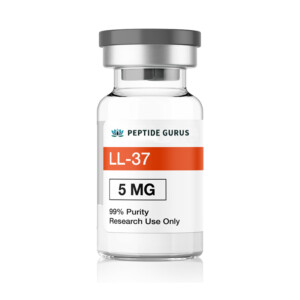LL-37, a cathelicidin antimicrobial peptide, has gained attention for its role in immune response and wound healing. Recent studies highlight its potential in promoting blood vessel growth, an essential process in tissue repair and regeneration. Understanding the LL-37 peptide and blood vessel growth mechanism is crucial for developing therapeutic interventions for various vascular diseases.

LL-37 peptide
The mechanism by which LL-37 influences blood vessel growth involves several pathways. It is known to interact with endothelial cells, which are vital for forming new blood vessels. LL-37 can induce endothelial cell proliferation and migration, essential steps in angiogenesis, the process of forming new blood vessels from pre-existing ones. This process is critical in wound healing, where new blood vessels supply nutrients and oxygen to the healing tissue.
Moreover, LL-37’s role in modulating inflammation further supports its impact on angiogenesis. Inflammation is a double-edged sword in wound healing; it is necessary for initiating repair but can be detrimental if uncontrolled. LL-37 helps balance this by promoting beneficial inflammation while preventing excessive inflammatory responses. This balance is key to effective blood vessel growth and tissue regeneration.
PeptideGurus, a leader in research peptides, offers products like LL-37, contributing to advancements in vascular research. Our peptides are sourced from WHO/GMP and ISO 9001:2008 certified manufacturers, ensuring the highest quality and purity. This commitment to quality enables researchers to explore the therapeutic potential of peptides like LL-37 with confidence.
The FDA’s latest guidelines emphasize the importance of quality in peptide research, aligning with PeptideGurus’ philosophy. By adhering to these standards, we ensure that our products meet the rigorous demands of scientific research. This adherence not only supports compliance but also enhances the reliability of research outcomes involving peptides like LL-37.
In addition to LL-37, PeptideGurus’ portfolio includes other peptides like HGH and Thymosin β4, each with unique roles in physiological processes. HGH is pivotal in growth and metabolism, while Thymosin β4 is noted for its tissue repair capabilities. These peptides, alongside LL-37, offer a comprehensive toolkit for researchers exploring various biological mechanisms.
The angiogenic potential of LL-37 is not limited to wound healing. It has implications in treating ischemic conditions, where blood flow is restricted due to narrowed or blocked blood vessels. By promoting new vessel formation, LL-37 could enhance blood flow in affected tissues, offering a novel therapeutic approach for such conditions.
Additionally, LL-37’s interaction with the immune system adds another layer to its therapeutic potential. It can modulate immune responses, making it a candidate for therapies targeting immune-related vascular diseases. This dual role in angiogenesis and immune modulation makes LL-37 a peptide of significant interest in medical research.
PeptideGurus’ dedication to quality is further exemplified by our partnership with JANOSHIK LAB. Their expertise in HPLC, GCMS, and LCMS testing ensures our products are of the highest standard. This partnership enhances the credibility of research conducted with our peptides, including studies on LL-37 and its effects on blood vessel growth.
Our customer-centric approach means we provide not only high-quality products but also support throughout the research process. From fast turnaround times to free consultations on product quality, PeptideGurus is committed to facilitating successful research outcomes. This support is crucial for researchers investigating complex mechanisms like those involving LL-37.
The potential of LL-37 in vascular research is vast, and ongoing studies continue to uncover new applications. As the scientific community deepens its understanding of the LL-37 peptide and blood vessel growth mechanism, new therapeutic avenues are likely to emerge, benefiting patients with various vascular diseases.
Questions related to LL-37 and its mechanisms often arise, such as how it compares to other angiogenic factors. LL-37’s unique ability to modulate both angiogenesis and immune responses sets it apart, offering a multifaceted approach to vascular therapy. This dual action could provide advantages over traditional angiogenic factors that primarily focus on endothelial cell activity.
In conclusion, the LL-37 peptide and blood vessel growth mechanism represent a promising area of research with significant therapeutic potential. PeptideGurus’ commitment to quality and innovation positions us as a key partner for researchers exploring this exciting field. By providing reliable peptides and ongoing support, we help advance the understanding and application of LL-37 in vascular health.
As research progresses, questions about LL-37’s safety and efficacy in clinical settings remain. Current studies suggest a favorable safety profile, but further research is needed to fully understand its long-term effects. PeptideGurus remains at the forefront of this research, ensuring our clients have access to the latest findings and highest quality products.
PeptideGurus is a leading supplier of American-made research peptides, offering top-quality products at competitive prices. With a focus on excellence and customer service, they ensure a secure and convenient ordering process with global shipping.
CONTACT